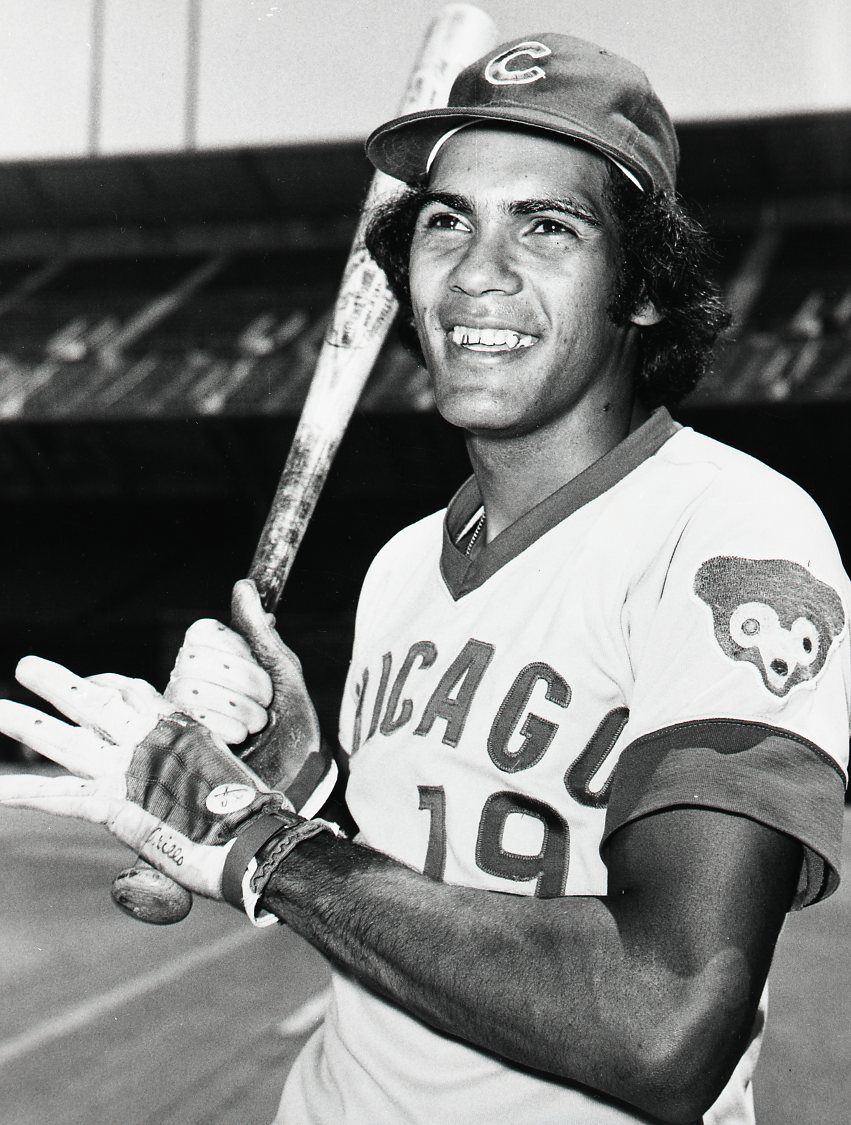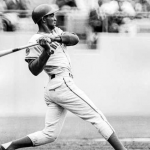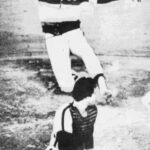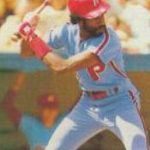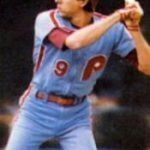Manny Trillo Stats & Facts
VINTAGE BASEBALL MEMORABILIA
Manny Trillo
Positions: Second Baseman, Third Baseman and First Baseman
Bats: Right • Throws: Right
6-1, 150lb (185cm, 68kg)
Born: December 25, 1950 in Caripito, Venezuela
High School: Tecnica Industrial (Maturin-Monagas, Venezuela)
Debut: June 28, 1973 (10,988th in MLB history)
vs. KCR 3 AB, 1 H, 0 HR, 1 RBI, 0 SB
Last Game: May 20, 1989
vs. CHC 4 AB, 0 H, 0 HR, 0 RBI, 0 SB
Full Name: Jesus Manuel Marcano Trillo
View Player Bio from the SABR BioProject
Nine Players Who Debuted in 1973
Dave Winfield
George Brett
Dave Parker
Brian Downing
Frank White
Bill Madlock
Frank Tanana
Steve Rogers
Randy Jones
Notable Events and Chronology for Manny Trillo Career
Intro
One of the finest defensive second baseman in baseball in the 1970s and 1980s, Manny Trillo was a four-time All-Star. The popular Venezuelan was a light-hitter most of his career, but in the 1980 NLCS he hit .381 with eight hits and four RBI to pace the Phillies past the Astros. He won three Gold Glove Awards and was noted for his powerful throwing arm and ability to turn the double play. His skill with the leather allowed him to play 17 seasons in the big leagues and accumulate more than 1,500 hits.
Manny Trillo
Originally signed as a catcher by the Philadelphia Phillies in 1968, Trillo was converted into a third baseman by his first minor league manager, Dallas Green. In 1969, he was selected by the Oakland Athletics from the Phillies in the Rule 5 draft. Trillo was converted into a second baseman in 1973 while playing for the Athletics’ Triple A team, the Tucson Toros. He made his Major League debut with Oakland on June 28, 1973 and stayed with the club as the Athletics won the American League Western Division pennant by six games over the Kansas City Royals, then defeated the Baltimore Orioles in the 1973 American League Championship Series.
Trillo had a minor role in a controversial incident during the 1973 World Series against the New York Mets. Athletics’ second baseman Mike Andrews committed two errors in a four-run twelfth inning of Game 2, leading to a Mets’ victory. Athletics team owner Charlie Finley attempted to have Andrews waived onto the disabled list in order to activate Trillo into the line up. Eventually, commissioner Bowie Kuhn ruled the move illegal and, forced Finley to reinstate Andrews for Game 4.
In April 1974, Trillo played 12 games for the Athletics before being sent back to the minor league Tucson Toros. He was eventually brought back to the major leagues in September. He appeared in one game of the 1974 American League Championship Series against the Baltimore Orioles, but didn’t make any further appearances as the Athletics defeated the Los Angeles Dodgers in the 1974 World Series.
On October 23, 1974, Trillo was traded along with Darold Knowles and Bob Locker to the Chicago Cubs for Billy Williams. Trillo would finish third in the 1975 National League Rookie of the Year Award balloting. With the Cubs, Trillo developed a reputation for being one of the best fielding second basemen in baseball, earning his first All-Star selection in 1977. Together with Cubs’ shortstop Iván DeJesús, he formed one of the best double play combinations in baseball. He remained with the Cubs for four seasons before being traded to the Philadelphia Phillies on February 23, 1979 as part of an eight-player trade. Later that season, Trillo was reunited with his former minor league manager, Dallas Green, who had replaced Danny Ozark as the Phillies’ manager. Trillo would win his first Gold Glove Award in 1979.
Trillo was an integral member of the 1980 world champion Phillies, adding solid defense, while hitting for over a .300 batting average until the middle of September, finishing the season with a career-high .292 average. He won the 1980 Silver Slugger Award for second basemen which, is awarded annually to the best offensive player at each position. In the 1980 National League Championship Series against the Houston Astros, he posted a .381 batting average with four runs batted in, and teamed up with Bake McBride in the decisive Game 5 to relay a throw to home plate, cutting off Luis Pujols attempting to score from first base on a double by Craig Reynolds. Trillo’s performance earned him the League Championship Series Most Valuable Player Award.
In the 1980 World Series against the Kansas City Royals, Trillo once again made his mark in Game 5 by making another relay throw to cut off Darrell Porter trying to score in the sixth inning. He then hit a single with two outs in the ninth inning to drive home the winning run.The Phillies went on to win Game 6 and claimed the first world championship in the team’s history.
1981 would be another good year for Trillo as he was selected as a reserve for the National League All-Star team, and won his second Gold Glove Award and his second consecutive Silver Slugger Award. He was voted to be the starting second baseman for the National League in the 1982 All-Star Game and, set a since-broken major league record for consecutive errorless chances at second base (479), falling two games short of Joe Morgan’s record 91-game errorless streak.
On December 9, 1982, Trillo was traded to the Cleveland Indians in a multi-player deal. In 1983, he made his second consecutive start as the All-Star second baseman, this time for the American League. Trillo would also win his third and final Gold Glove Award in 1983. He would spend the next six seasons with several teams, serving as a utility player before ending his career in 1989 with the Cincinnati Reds.
Best Season, 1980
In the regular season, Trillo hit a career-best .292 with a career-high 41 extra-base hits. He made just 11 errors and fielded .987 at second base. In the playoffs against the Astros, he hit .381 and won the ALCS MVP Award. In Game Five of the World Series against the Royals, Trillo hit a sharp grounder off Dan Quisenberry’s glove in the ninth inning to drive in the game-winning run.
Awards and Honors
1979 NL Gold Glove
1980 NL NLCS MVP
1981 NL Gold Glove
1982 NL Gold Glove
All-Star Selections
Post-Season Appearances
1974 American League Championship Series
1980 National League Championship Series
1980 World Series
1981 National League Division Playoffs
Factoid
All-Star second baseman Manny Trillo was originally signed as a catcher.
Notes
The 1977 Cubs had the worst second-half collapse in baseball history (based on winning percentage). The team was 51-30 in the first half, and 30-51 after. They limped to a fourth-place finish, 20 games behind the Phillies. At the mid-way point, the Cubs had held a four-game advantage. Trillo was one of the big reasons the Cubs had such a good first-half. He batted .392 in May with a very un-Trillo-like .618 slugging percentage. But Manny batted just .223 after June 30th, with just seven extra-base hits, doing his part to contribute to the Chicago swan dive.
Quotes About Trillo
“It’s like we’ve been together for 10 years, he’s so easy to play with.” — Shawon Dunston in 1986
Quotes From Trillo
“They always ask me ‘Why do I play so smooth?’ ‘Why do I always look like I don’t want to play?” I say, ‘That’s just the way I play. You never see me go slow for a ball.”
Home Run Facts
Trillo hit 25 homers in just under 1,500 career at-bats in Wrigley Field. He hit just 36 homers in 4,456 at-bats elsewhere. His career AVG and SLG in Wrigley: .282/.383. Elsewhere: .256/.332
All-Star Selections
1977 NL
1981 NL
1982 NL
1983 AL
Other Resources & Links

